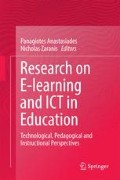Abstract
Teachers’ professional development (TPD) in the pedagogical and instructional use of ICT I Greece, known as B-Level, was implemented on a pilot basis with a blended learning program called Meikto which included a combination of face-to-face and distance sessions and activities. The distance part included synchronous sessions via Blackboard and non-synchronous activities using Moodle. This paper analyzes the basic design principles, structure, and content of the blended learning program Meikto for compulsory education secondary science teachers and presents selected results concerning the views of the trainees who attended its pilot implementation in two training centers. Trainee responses to a questionnaire after the program show considerable interest, acceptance, and positive response regarding the distant activities and their combination as well as the affordances regarding the development of their TPACK.
Access this chapter
Tax calculation will be finalised at checkout
Purchases are for personal use only
References
Alayyar, G., Fisser, P., & Voogt, J. (2012). Developing technological pedagogical content knowledge in pre-service science teachers: Support from Blended Learning. Australian Educational Technology Journal, 28(8), 1298–1316.
B Level. (2010). Educational package for the professional development of teachers in the Centers for Supporting PDT, section 5 science teachers. Scientific Coordinator D Psillos Black board http://www.blackboard.com
Berger, H., Eylon, B.-S., & Bagno, E. (2008). Professional development of physics teachers in an evidence-based blended learning program. Journal of Science Education and Technology, 17(4), 399–409.
Chai, C.-S., Koh, J. H.-L., & Tsai, C.-C. (2013). A review of technological pedagogical content knowledge. Educational Technology & Society, 16(2), 31–51.
Computer Technology Institute & Press—“Diophantus” (CTI) Project. (2007–2013). In-Service Training of Teachers for the utilisation and application of ICT in the teaching practice of the Operational Program “Lifelong Learning”, NSRF (2007–2013), co-financed by Greece and the European Union (European Social Fund).
Doering, A., Veletsianos, G., Scharber, C., & Miller, C. (2009). Using the technological, pedagogical, and content knowledge framework to design online learning environments and professional development. Journal of Educational Computing Research, 41(3), 319–346.
El-Deghaidy, H., & Nouby, A. (2008). Effectiveness of a blended e-learning cooperative approach in an Egyptian teacher education program. Computers & Education, 51(3), 988–1006.
Fozdar, P.I. & Kumar, L.S. (2007). Mobile learning and student retention. The International Review of Research in Open and Distance Learning, 8(2), http://www.irrodl.org/index.php/irrodl/index, (16/01/2011).
Garrison, D., & Kanuka, H. (2004). Blended learning: Uncovering its transformative potential in higher education. Internet and Higher Education, 7, 95–105.
Gerbic, P. (2011). Teaching using a blended approach—what does the literature tell us? Educational Media International, 48(3), 221–234.
Ginns, P., & Ellis, R. (2007). Quality in blended learning: Exploring the relationships between online and face to face teaching and learning. The Internet and Higher Education, 10(1), 53–64.
Hofmann, J. (2006). Why blended learning hasn't (yet) fulfilled its promises: Answers to those questions that keep you up at night. In C. J. Bonk & C. R. Graham (Eds.), The Handbook of Blended Learning: Global Perspectives, Local Designs (pp. 27–40). San Francisco: Pfeiffer.
Interactive Physics. http://www.design-simulation.com/ip/
Kalantzis, M., & Bill, C. (2010). “The teacher as designer: Pedagogy in the new media age." e-learning and digital. Media, 7, 200–222.
Keengwe, J., & Kang, J.-J. (2012). A review of empirical research on blended learning in teacher education programs. Education and Information Technologies, 8(2), 81–93.
Lee, M.-H., & Tsai, C.-C. (2010). Exploring teachers’ perceived self efficacy and technological pedagogical content knowledge with respect to educational use of the World Wide Web. Instructional Science, 38(1), 1–21.
Maeng, J. L., Mulvey, B. K., Smetana, L. K., & Bell, R. L. (2013). Preservice teachers’ TPACK: using technology to support inquiry instruction. Journal of Science Education and Technology, 22, 838–857.
Mishra, P., & Koehler, M. J. (2006). Technological pedagogical content knowledge: A framework for teacher knowledge. Teachers College Record, 108(6), 1017–1054.
Owston, R. (2013). Blended learning policy and implementation: Introduction to the special issue. Internet and Higher Education, 18, 1–3.
Owston, R., Sinclair, M., & Wideman, H. (2008). Blended learning for professional development: An evaluation of a program for middle school mathematics and science teachers. Teachers College Record, 110(5), 1033–1064.
Park, S., Jang, J. Y., Chen, Y. C., & Jung, J. (2011). Is pedagogical content knowledge (PCK) necessary for reformed science teaching?: Evidence from an empirical study. Research Science Education, 41, 245–260. doi:10.1007/s11165-009-9163-8.
Psillos, D., Paraskevas, A. (2014). Teachers’ views about Technological Pedagogical Content Knowledge: The case of Science Teachers. In Proceedings of 9th Panhellenic Congress, Technology in Education (pp. 508–516) www.hcicte.edc.uoc.gr (02/07/2015). (in Greek)
So, H.-J., & Kim, B. (2009). Learning about problem based learning: Student teachers integrating technology, pedagogy and content knowledge. Australasian Journal of Educational Technology, 25(1), 101–116.
Vaughan, N. (2007). Perspectives on blended learning in higher education. International Journal on ELearning, 6(1), 81–94.
Acknowledgments
The development and application of the blended model is carried out in the context and with the valuable support of project “In-Service Training of Teachers for the utilisation and application of ICT in the teaching practice” of the Operational Program “Lifelong Learning,” NSRF (2007–2013), cofinanced by Greece and the European Union (European Social Fund) run by the Computer Technology Institute & Press—“Diophantus” (CTI). The author is also grateful to his colleagues Th. Taramopoulos, L. Antonoglou, A. Samantas, A. Paraskevas, I. Lefkos, A. Molochidis, A. Barbas, Ch. Apostolou, D. Ioannidis, Ch. Patsakidis, and K. Styliadis, each of whom had a discrete role and part in the development and pilot implementation.
Author information
Authors and Affiliations
Corresponding author
Editor information
Editors and Affiliations
Rights and permissions
Copyright information
© 2017 Springer International Publishing Switzerland
About this chapter
Cite this chapter
Psillos, D. (2017). Development of a Blended Learning Program and Its Pilot Implementation for Professional Development of Science Teachers. In: Anastasiades, P., Zaranis, N. (eds) Research on e-Learning and ICT in Education. Springer, Cham. https://doi.org/10.1007/978-3-319-34127-9_14
Download citation
DOI: https://doi.org/10.1007/978-3-319-34127-9_14
Published:
Publisher Name: Springer, Cham
Print ISBN: 978-3-319-34125-5
Online ISBN: 978-3-319-34127-9
eBook Packages: EducationEducation (R0)

